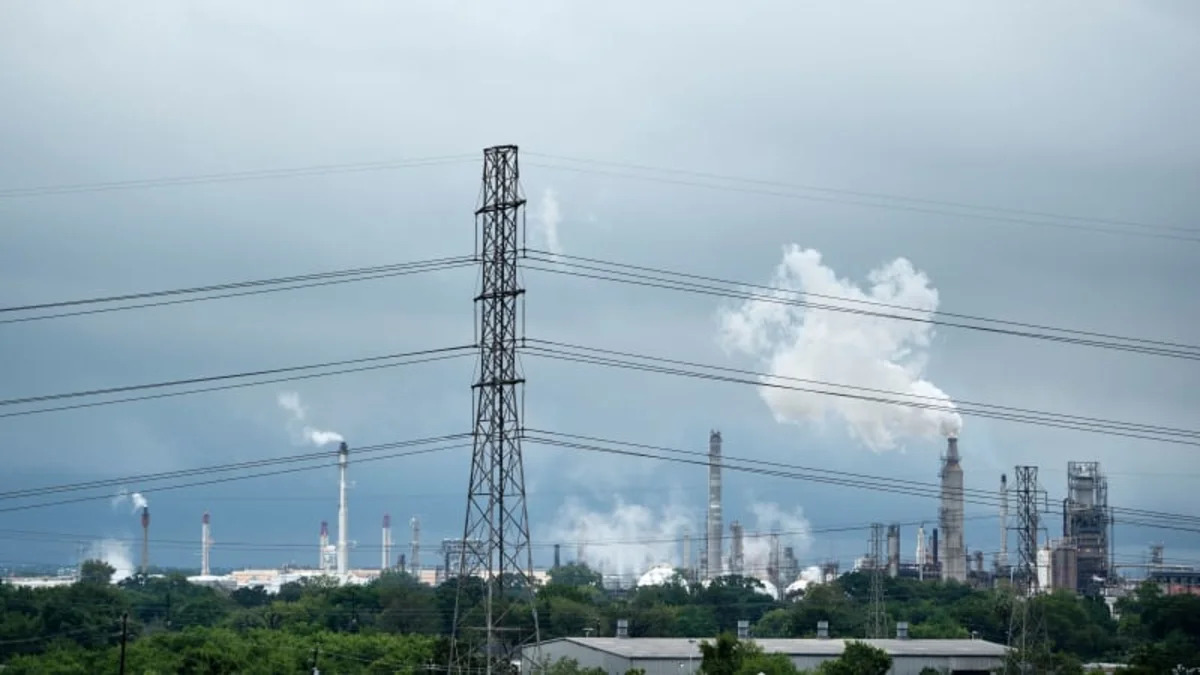Tropical Storm Harvey made landfall in Louisiana early on Wednesday after hammering Texas, threatening more infrastructure in the heart of the U.S. oil and natural gas industry.
U.S. drivers are starting to feel the effects of Harvey in their wallets as the country's fuel distribution network starting at the Gulf Coast and stretching across the country is squeezed by floods, refinery closures and dwindling supplies.
The U.S. National Hurricane Center said Harvey came ashore just west of Cameron, Louisiana, and was expected to weaken to a tropical depression by Wednesday evening.
Numerous refineries, terminals, drilling platforms and other infrastructure have shut. At least 4.2 million bpd of refining capacity was offline, or more than 22 percent of total U.S. capacity, based on company reports and Reuters estimates. The Gulf is home to nearly half of U.S. refining capacity.
Texas is home to 5.6 million barrels per day (bpd) of refining capacity, and neighboring Louisiana has 3.3 million bpd.
Valero Energy Corp's 335,000-barrel-per-day (bpd) Port Arthur, Texas, refinery was shut on Wednesday morning, according to sources familiar with plant operations. Total SA's 225,500-bpd Port Arthur, Texas, refinery was shut by an early-Wednesday power outage, Gulf Coast market sources said.
Motiva Enterprises began shutting down its 603,000-bpd Port Arthur, Texas, refinery, the nation's largest, on Tuesday evening due to flooding within the plant, said sources familiar with plant operations.
'THIS WILL AFFECT EVERYONE'
The longer refineries remain shut, the more retail prices will increase, traders and analysts said. Two of the major pipelines delivering gasoline, diesel and jet fuel from the Gulf Coast are operating at reduced rates or plan to shut entirely, with wholesale markets in Chicago and the Gulf region seeing sharply higher prices.
"Basically this will affect everyone across the country on some level and your proximity to the supply chain will affect how severe the impact is to you," said Jeff Lenard, NACS vice president of strategic industry initiatives, which represents 80 percent of all gasoline volume sold in the country.
In 2016, about 143.37 billion gallons (or about 3.41 billion barrels) of finished motor gasoline were consumed in the United States, according to the U.S. Department of Energy. That translates to a daily average of about 391.73 million gallons (or about 9.33 million barrels per day).
The national average gas price has increased three cents since Friday, according to the American Automobile Association (AAA), the country's largest motorists' advocacy group. Analysts said that it could take a few days to weeks for price increases to be fully reflected at the pump.
States likely to see the largest price increases are Texas, Louisiana, Arkansas, and Tennessee, AAA said. Prices are already up by six cents a gallon in Washington, D.C., Georgia and South Carolina since Friday, when the national average was about $2.35 a gallon.
On Tuesday, the national average was $2.378 a gallon, according to AAA.
Even after the storm passes and refineries restart, roads damaged by flood waters and obstructed by trees and debris, could impede delivery for some time.
PIPELINES THROTTLED BACK
Pipeline delivery is being throttled back due to the storm. The Explorer Pipeline, which hauls about 660,000 barrels a day of gasoline, diesel, fuel oil and jet fuel from the Gulf Coast to the Midwest, was due to shut its main lines on Wednesday.
Colonial Pipeline, the largest refined products pipeline in the United States, is operating at reduced capacity due to limited supply out of Houston. That line is the key artery to the populous East Coast.
Other pipelines that haul fuel from the Gulf Coast including the 700,000 bpd Kinder Morgan Plantation pipeline and Enterprise Products Partners' TE Products system were functional.
Sources have said that U.S. oil majors were meeting with industry partners to discuss what could be done to direct supplies into some of the hardest-hit areas.
"Our Houston-area terminals currently have inventory and are able to provide fuel supply to the stations in the region once the flooding clears, roads reopen and service stations are assessed," a Chevron spokesman said in an email to Reuters.
Exxon Mobil referred Reuters to trade associations, saying this is an industry-wide issue.
The timing of the storm in Texas is particularly challenging to the fuel distribution system because several parts of the country were already facing disruptions due to high demand from the solar eclipse last week, experts said.
Reporting by Devika Krishna Kumar
Related Video:


Sign in to post
Please sign in to leave a comment.
Continue